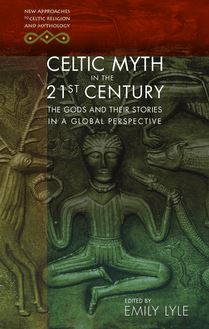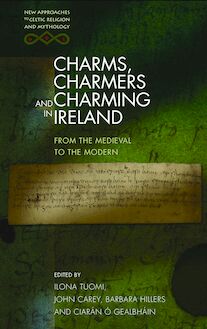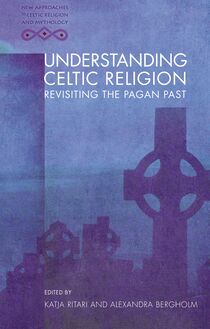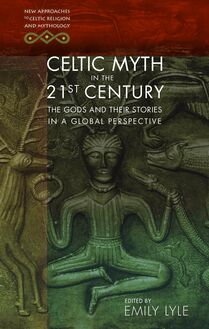-
 Univers
Univers
-
 Ebooks
Ebooks
-
 Livres audio
Livres audio
-
 Presse
Presse
-
 Podcasts
Podcasts
-
 BD
BD
-
 Documents
Documents
-
- Cours
- Révisions
- Ressources pédagogiques
- Sciences de l’éducation
- Manuels scolaires
- Langues
- Travaux de classe
- Annales de BEP
- Etudes supérieures
- Maternelle et primaire
- Fiches de lecture
- Orientation scolaire
- Méthodologie
- Corrigés de devoir
- Annales d’examens et concours
- Annales du bac
- Annales du brevet
- Rapports de stage
La lecture à portée de main
Vous pourrez modifier la taille du texte de cet ouvrage
Découvre YouScribe en t'inscrivant gratuitement
Je m'inscrisDécouvre YouScribe en t'inscrivant gratuitement
Je m'inscrisEn savoir plus
Vous pourrez modifier la taille du texte de cet ouvrage
En savoir plus

Description
Although it has long been acknowledged that the early Irish literary corpus preserves both pre-Christian and Christian elements, the challenges involved in the understanding of these different strata have not been subjected to critical examination. This volume draws attention to the importance of reconsidering the relationship between religion and mythology, as well as the concept of ‘Celtic religion’ itself. When scholars are attempting to construct the so-called ‘Celtic’ belief system, what counts as ‘religion’? Or, when labelling something as ‘religion’ as opposed to ‘mythology’, what do these entities entail? This volume is the first interdisciplinary collection of articles which critically reevaluates the methodological challenges of the study of ‘Celtic religion’; the authors are eminent scholars in the field of Celtic Studies representing the disciplines of theology, literary studies, history, law and archaeology, and the book represents a significant contribution to the present scholarly debate concerning the pre-Christian elements in early medieval source materials.
1 Introduction: ‘Celtic Religion’: Is this a Valid Concept?
Alexandra Bergholm and Katja Ritari
2 Celtic Spells and Counterspells
Jacqueline Borsje
3 The Gods of Ireland in the Later Middle Ages
John Carey
4 Staging the Otherworld in Medieval Irish Literature
Joseph Falaky Nagy
5 The Biblical Dimension of Early Medieval Latin Texts
Thomas O’Loughlin
6 Ancient Irish Law Revisited: Rereading the Laws of Status and Franchise
Robin Chapman Stacey
7 A Dirty Window on the Iron Age? Recent Developments in the Archaeology of Pre-Roman Celtic Religion
Jane Webster
Sujets
Informations
| Publié par | University of Wales Press |
| Date de parution | 20 novembre 2015 |
| Nombre de lectures | 0 |
| EAN13 | 9781783167937 |
| Langue | English |
Informations légales : prix de location à la page 0,1500€. Cette information est donnée uniquement à titre indicatif conformément à la législation en vigueur.
Extrait
NEW APPROACHES TO CELTIC RELIGION AND MYTHOLOGY
Series Editor
Jonathan Wooding, University of Sydney
Editorial Board
Jacqueline Borsje, University of Amsterdam
John Carey, University College Cork
Joseph F. Nagy, University of California, Los Angeles
Thomas O’Loughlin, University of Nottingham
Katja Ritari, University of Helsinki
NEW APPROACHES TO CELTIC RELIGION AND MYTHOLOGY
UNDERSTANDING CELTIC RELIGION
REVISITING THE PAGAN PAST
EDITED BY
KATJA RITARI AND ALEXANDRA BERGHOLM
© The Contributors, 2015
All rights reserved. No part of this book may be reproduced in any material form (including photocopying or storing it in any medium by electronic means and whether or not transiently or incidentally to some other use of this publication) without the written permission of the copyright owner. Applications for the copyright owner’s written permission to reproduce any part of this publication should be addressed to the University of Wales Press, 10 Columbus Walk, Brigantine Place, Cardiff CF10 4UP.
www.uwp.co.uk
British Library CIP Data A catalogue record for this book is available from the British Library.
ISBN: 978-1-78316-792-0 e-ISBN: 978-1-78316-861-3
The right of the Contributors to be identified as authors of this work has been asserted in accordance with sections 77 and 79 of the Copyright, Designs and Patents Act 1988.
The chapter ‘Celtic Spells and Counterspells’ by Jacqueline Borsje is funded by the Netherlands Organisation for Scientific Research (NWO) for publication under a Creative Commons Attribution Non-commercial Non-derivative International licence (CC BY-NC-ND). This licence allows you to share, copy, distribute and transmit the work for personal and non-commercial use providing author and publisher attribution is clearly stated; this chapter is also available at dare.uva.nl.
Further details about CC BY licences are available at http://creativecommons.org/licenses/
Cover image: © RF Corbis Value / Alamy Cover design: Olwen Fowler
CONTENTS
List of Illustrations
List of Abbreviations
List of Contributors
Foreword by Jonathan Wooding
1 Introduction: ‘Celtic Religion’: Is this a Valid Concept? Alexandra Bergholm and Katja Ritari
2 Celtic Spells and Counterspells Jacqueline Borsje
3 The Old Gods of Ireland in the Later Middle Ages John Carey
4 Staging the Otherworld in Medieval Irish Tradition Joseph Falaky Nagy
5 The Biblical Dimension of Early Medieval Latin Texts Thomas O’Loughlin
6 Ancient Irish Law Revisited: Rereading the Laws of Status and Franchise Robin Chapman Stacey
7 A Dirty Window on the Iron Age? Recent Developments in the Archaeology of Pre-Roman Celtic Religion Jane Webster
Bibliography
LIST OF ILLUSTRATIONS
FIG. 1 Pilier des Nautes: Pierre de Jupiter. Photograph © RMN-Grand Palais (Musée de Cluny – Musée National du Moyen-Âge)/Jean-Gilles Berizzi/Gérard Blot.
FIG. 2 Mercury and Rosmerta, from Shakespeare Inn, Gloucester. Photograph © Gloucester Museums Service.
FIG. 3 A suggested reconstruction of the Forty Metre Structure. Reproduced with the permission of the NIEA.
LIST OF ABBREVIATIONS BAR British Archaeological Reports CCCM Corpus Christianorum Continuatio Mediaevalis CCSL Corpus Christianorum Series Latina CG Críth Gablach CIH Corpus Iuris Hibernici CMCS Cambridge Medieval Celtic Studies (1−25), thence Cambrian Medieval Celtic Studies (26−) CSANA Celtic Studies Association of North America CSEL Corpus Scriptorum Ecclesiasticorum Latinorum CSIR Corpus Signorum Imperii Romani DIL Royal Irish Academy Dictionary of the Irish Language EC Études celtiques ITS Irish Texts Society JRA Journal of Roman Archaeology LU Lebor na hUidre MGH AA Monumenta Germaniae Historica: Auctores Antiquissimi MMIS Medieval and Modern Irish Series PL Patrologia Latina PsG Greek Psalms from the Septuagint PsH Hebrew Psalms PRIA Proceedings of the Royal Irish Academy RC Revue celtique SCF Studia Celtica Fennica YBL Yellow Book of Lecan ZCP Zeitschrift für celtische Philologie
LIST OF CONTRIBUTORS
Alexandra Bergholm is Visiting Fellow at the University of Edinburgh
Jacqueline Borsje is Senior Lecturer in the Cultural History of Christianity (Religious Studies, University of Amsterdam) and Associate Member of the Research Institute for Irish and Celtic Studies, University of Ulster
John Carey is Professor of Early and Medieval Irish, University College Cork
Joseph Nagy is Professor at the Department of English, UCLA
Thomas O’Loughlin is Professor of Historical Theology, University of Nottingham
Katja Ritari is Research Fellow at Helsinki Collegium for Advanced Studies, University of Helsinki
Robin Chapman Stacey is Professor at the Department of History, University of Washington
Jane Webster is Senior Lecturer in Historical Archaeology, Newcastle University
Jonathan Wooding is Professor of Celtic Studies, University of Sydney
FOREWORD BY THE SERIES EDITOR
I t is timely that one of the major university presses in the Celtic nations is launching a series on approaches to Celtic religion and mythology. The myths and religious ideas of the Celtic-speaking peoples have had an enduring appeal for scholars as well as general readers. Our new series acknowledges this long-standing interest, while also picking up on the particular energy that approaches to religion and spirituality have brought to studies of Celtic sources across recent decades. By the end of the 1980s the old conception of a ‘Celtic Church’ had been set aside – and with it long- held assumptions of cultural isolation and insularity. At the same time, another revisionist movement, arising from studies of narrative literature, took aim at ‘nativist’ approaches to literature; these had been concerned with perceived mythic structures in texts, but often at the expense of narrative meanings and the more immediate sources of tradition. Such revisionist perspectives, though arising in the first instance out of more historical and literary concerns, had the effect of opening up new spaces for the study of scriptural, patristic, and classical influences on a Celtic culture which had too often been perceived as isolated and exceptional.
Scholars of religion from a range of countries – several of whom contribute to this first volume of our series – were thus encouraged to engage with Celtic topics. A further generation of scholars – amongst them two outstanding Finnish scholars who are the editors of the present collection – have taken this study further forward. At the same time, developments in the disciplines of Religious Studies and Theology brought new perspectives on questions of indigenous religion, narrative studies of myth, and historical interpretation of theology – all of which benefit studies of Celtic sources. In Classical studies, new approaches to Roman provincial religion and religious diversity in late antiquity further serve to contextualise developments in the religions of the Celtic-speaking peoples. We are beginning to move beyond a preoccupation with defining what is – or what is not – distinctly ‘Celtic’, to find new energy in studying the processes of encounter between religious cultures.
The studies in this first volume all set examples of how to bring new approaches to traditional data. Together they make an outstanding collection and an exciting start to our series.
Jonathan Wooding University of Sydney, Australia
1
INTRODUCTION: ‘CELTIC RELIGION’: IS THIS A VALID CONCEPT? 1
Alexandra Bergholm and Katja Ritari
T he last few decades have witnessed a paradigmatic change in the human sciences which has challenged the very basis of the process of acquiring knowledge. In the study of history, the point at issue is the one about possessing ‘objective’ knowledge of the past: if all history is unavoidably situated, how do the scholars’ presuppositions and methodological choices concerning the ‘proper’ way of ‘doing history’ shape our understanding of historical reality? 2
It could be argued that the reverberations of this shift have been slow to reach Celtic Studies, which since its inception as an academic discipline in the nineteenth century has been firmly grounded on the methodological premises of comparative philology. Indeed, writing less than twenty years ago in 1996, Hildegard L. C. Tristram could observe that ‘[c]ritical discourse has only just begun in Celtic Studies and research with more modern methodologies than philology are [sic] as yet rare’. 3 With regard to Tristram’s poignant remarks on the stagnant nature of scholarly discourse in the field, an illustrative case in point would be the so-called nativist/anti-nativist controversy, which until relatively recently dominated the study of early Irish textual material. As Jonathan Wooding has observed, this debate concerning the origin and nature of these sources had its roots planted in contemporary cultural politics and wider intellectual commitments of twentieth-century scholarship, and therefore cannot be seen as purely a problem of textual or literary analysis. 4 From a methodological point of view, however, what is particularly noteworthy is the manner in which the constructed oppositions characterising this polemic – oral/literary, native/foreign, archaic/medieval, or pre- Christian/Christian – reflect a particular understanding of the possibility of recovering historical ‘reality’ from early textual sources, which in itself stems from a fundamental, albeit narrowly conceived, philosophical dichotomy between truth and fiction. Thus, despite the polarised views of the two camps, the epistemological premise of the controversy was ultimately the same: to quote Wooding, ‘we either can recover the past – or earlier strata of texts – through “excavating” texts, or we cannot.’ 5
While the efforts of perpetuating and maintaining such rigid polarisations have gradually given way to more dynamic approaches, the question of the methodologies underpinning the study of various sources at our disposal stil
-
 Univers
Univers
-
 Ebooks
Ebooks
-
 Livres audio
Livres audio
-
 Presse
Presse
-
 Podcasts
Podcasts
-
 BD
BD
-
 Documents
Documents
-
Jeunesse
-
Littérature
-
Ressources professionnelles
-
Santé et bien-être
-
Savoirs
-
Education
-
Loisirs et hobbies
-
Art, musique et cinéma
-
Actualité et débat de société
-
Jeunesse
-
Littérature
-
Ressources professionnelles
-
Santé et bien-être
-
Savoirs
-
Education
-
Loisirs et hobbies
-
Art, musique et cinéma
-
Actualité et débat de société
-
Actualités
-
Lifestyle
-
Presse jeunesse
-
Presse professionnelle
-
Pratique
-
Presse sportive
-
Presse internationale
-
Culture & Médias
-
Action et Aventures
-
Science-fiction et Fantasy
-
Société
-
Jeunesse
-
Littérature
-
Ressources professionnelles
-
Santé et bien-être
-
Savoirs
-
Education
-
Loisirs et hobbies
-
Art, musique et cinéma
-
Actualité et débat de société
- Cours
- Révisions
- Ressources pédagogiques
- Sciences de l’éducation
- Manuels scolaires
- Langues
- Travaux de classe
- Annales de BEP
- Etudes supérieures
- Maternelle et primaire
- Fiches de lecture
- Orientation scolaire
- Méthodologie
- Corrigés de devoir
- Annales d’examens et concours
- Annales du bac
- Annales du brevet
- Rapports de stage













